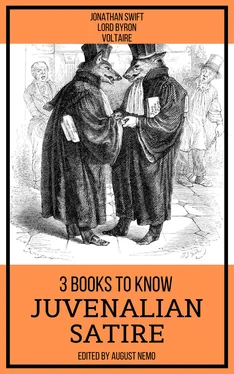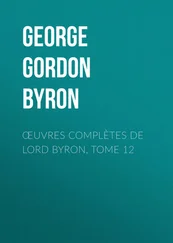Yet, if my gentle Muse he please to roast,
And break a promise after having made it her,
Denying the receipt of what it cost,
And smear his page with gall instead of honey,
All I can say is—that he had the money.
I think that with this holy new alliance
I may ensure the public, and defy
All other magazines of art or science,
Daily, or monthly, or three monthly; I
Have not essay'd to multiply their clients,
Because they tell me 't were in vain to try,
And that the Edinburgh Review and Quarterly
Treat a dissenting author very martyrly.
'Non ego hoc ferrem calida juventa
Consule Planco,' Horace said, and so
Say I; by which quotation there is meant a
Hint that some six or seven good years ago
(Long ere I dreamt of dating from the Brenta)
I was most ready to return a blow,
And would not brook at all this sort of thing
In my hot youth—when George the Third was King.
But now at thirty years my hair is grey
(I wonder what it will be like at forty?
I thought of a peruke the other day)—
My heart is not much greener; and, in short, I
Have squander'd my whole summer while 't was May,
And feel no more the spirit to retort; I
Have spent my life, both interest and principal,
And deem not, what I deem'd, my soul invincible.
No more—no more—Oh! never more on me
The freshness of the heart can fall like dew,
Which out of all the lovely things we see
Extracts emotions beautiful and new,
Hived in our bosoms like the bag o' the bee:
Think'st thou the honey with those objects grew?
Alas! 't was not in them, but in thy power
To double even the sweetness of a flower.
No more—no more—Oh! never more, my heart,
Canst thou be my sole world, my universe!
Once all in all, but now a thing apart,
Thou canst not be my blessing or my curse:
The illusion 's gone for ever, and thou art
Insensible, I trust, but none the worse,
And in thy stead I 've got a deal of judgment,
Though heaven knows how it ever found a lodgment.
My days of love are over; me no more
The charms of maid, wife, and still less of widow,
Can make the fool of which they made before,—
In short, I must not lead the life I did do;
The credulous hope of mutual minds is o'er,
The copious use of claret is forbid too,
So for a good old-gentlemanly vice,
I think I must take up with avarice.
Ambition was my idol, which was broken
Before the shrines of Sorrow, and of Pleasure;
And the two last have left me many a token
O'er which reflection may be made at leisure:
Now, like Friar Bacon's brazen head, I 've spoken,
'Time is, Time was, Time 's past:'—a chymic treasure
Is glittering youth, which I have spent betimes—
My heart in passion, and my head on rhymes.
What is the end of Fame? 't is but to fill
A certain portion of uncertain paper:
Some liken it to climbing up a hill,
Whose summit, like all hills, is lost in vapour;
For this men write, speak, preach, and heroes kill,
And bards burn what they call their 'midnight taper,'
To have, when the original is dust,
A name, a wretched picture, and worse bust.
What are the hopes of man? Old Egypt's King
Cheops erected the first pyramid
And largest, thinking it was just the thing
To keep his memory whole, and mummy hid;
But somebody or other rummaging,
Burglariously broke his coffin's lid:
Let not a monument give you or me hopes,
Since not a pinch of dust remains of Cheops.
But I being fond of true philosophy,
Say very often to myself, 'Alas!
All things that have been born were born to die,
And flesh (which Death mows down to hay) is grass;
You 've pass'd your youth not so unpleasantly,
And if you had it o'er again—'t would pass—
So thank your stars that matters are no worse,
And read your Bible, sir, and mind your purse.'
But for the present, gentle reader! and
Still gentler purchaser! the bard—that 's I—
Must, with permission, shake you by the hand,
And so 'Your humble servant, and good-b'ye!'
We meet again, if we should understand
Each other; and if not, I shall not try
Your patience further than by this short sample—
'T were well if others follow'd my example.
'Go, little book, from this my solitude!
I cast thee on the waters—go thy ways!
And if, as I believe, thy vein be good,
The world will find thee after many days.'
When Southey's read, and Wordsworth understood,
I can't help putting in my claim to praise—
The four first rhymes are Southey's every line:
For God's sake, reader! take them not for mine.
––––––––
O ye! who teach the ingenuous youth of nations,
Holland, France, England, Germany, or Spain,
I pray ye flog them upon all occasions,
It mends their morals, never mind the pain:
The best of mothers and of educations
In Juan's case were but employ'd in vain,
Since, in a way that 's rather of the oddest, he
Became divested of his native modesty.
Had he but been placed at a public school,
In the third form, or even in the fourth,
His daily task had kept his fancy cool,
At least, had he been nurtured in the north;
Spain may prove an exception to the rule,
But then exceptions always prove its worth—
A lad of sixteen causing a divorce
Puzzled his tutors very much, of course.
I can't say that it puzzles me at all,
If all things be consider'd: first, there was
His lady—mother, mathematical,
A—never mind; his tutor, an old ass;
A pretty woman (that 's quite natural,
Or else the thing had hardly come to pass);
A husband rather old, not much in unity
With his young wife—a time, and opportunity.
Well—well, the world must turn upon its axis,
And all mankind turn with it, heads or tails,
And live and die, make love and pay our taxes,
And as the veering wind shifts, shift our sails;
The king commands us, and the doctor quacks us,
The priest instructs, and so our life exhales,
A little breath, love, wine, ambition, fame,
Fighting, devotion, dust,—perhaps a name.
I said that Juan had been sent to Cadiz—
A pretty town, I recollect it well—
'T is there the mart of the colonial trade is
(Or was, before Peru learn'd to rebel),
And such sweet girls—I mean, such graceful ladies,
Their very walk would make your bosom swell;
I can't describe it, though so much it strike,
Nor liken it—I never saw the like:
An Arab horse, a stately stag, a barb
New broke, a cameleopard, a gazelle,
No—none of these will do;—and then their garb!
Their veil and petticoat—Alas! to dwell
Upon such things would very near absorb
A canto—then their feet and ankles,—well,
Thank Heaven I 've got no metaphor quite ready
(And so, my sober Muse—come, let 's be steady—
Chaste Muse!—well, if you must, you must)—the veil
Thrown back a moment with the glancing hand,
While the o'erpowering eye, that turns you pale,
Flashes into the heart:—All sunny land
Of love! when I forget you, may I fail
To—say my prayers—but never was there plann'd
A dress through which the eyes give such a volley,
Excepting the Venetian Fazzioli.
But to our tale: the Donna Inez sent
Her son to Cadiz only to embark;
To stay there had not answer'd her intent,
But why?—we leave the reader in the dark—
Читать дальше












